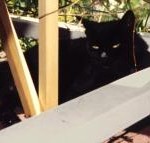Note: This entry has been restored from old archives.

Today I heard the sad news of a death in the family. I still remember the day we bought “Captain Midnight” at the pet shop round back of the cinema in Busso. It was my choice of kitten and my choice of silly name, but I was only about 6 at the time. It wasn’t long after we learnt that “he” was a “she”, the name “Capi” stuck but there was never any agreement on what it was short for, if anything. Her death is not unexpected, she was old, a recurring topic of conversation on my infrequent calls home was “So, Capi still around is she?”
Capi lived through many an interesting time, children trying to bathe her, at least 5 house moves (between rural and urban settings), dislocated hip from a fall (cat’s don’t always land gracefully), and maybe even a snake bite? Not sure about that last one. Like many pets she racked up the vet bills over the years (starting with the fact that it costs a lot more to sterilise a female than a male). She out-lived some; Minty, our other cat, lost twice but rediscovered the first time after an absence of many months; Zeus, a German Shepard we inherited from an employee who moved away, he died in his sleep one night. And will be outlived by many, all the humans in the family, thankfully, and Ollie, a German Short Haired Pointer and youngest in the family.
Sometimes I thought of Capi as “my cat”, but this is disingenuous as over the years it was Mum who fed her and put up with her. After all, I moved to school when I was 14 and barely lived at home again after that (there was that year between high-school and Uni I guess). So in the end I was part of Capi’s household for less than half her life.
Capi was always there, on every one of my semi-annual trips home. Often the first person I’d meet when I got home. Every year a bit scrawnier, this year more a bag of bones than anything. We knew it wouldn’t be long. It’s hard to imagine she won’t be there next time I visit though. I always liked to believe that she remembered me, but I guess this is unlikely.



